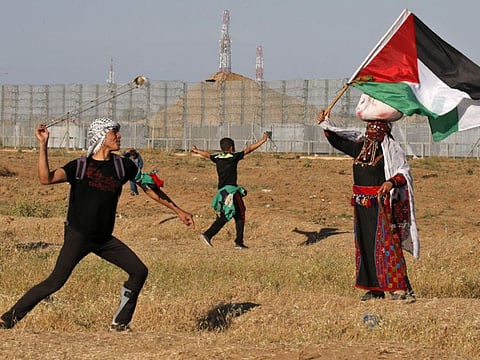Gaza lives: The great Palestinian sea will swallow the occupier
Palestinian steadfastness is far superior a weapon than Israel’s military

Just hours after a truce was announced following Israel’s latest military attack on Gaza, Palestinians in the impoverished and besieged Gaza Strip resumed their daily activities as usual.
Normalcy in Gaza is a precarious term. Even before the latest onslaught of May 4 — the killing of 25 Palestinians, the wounding of hundreds more and the destruction of numerous homes, offices and schools — life in Gaza was not exactly ‘normal’.
The tiny and overcrowded Strip has been reeling under an Israeli blockade which has been in place for 12 years. Moreover, several massively destructive wars have done more than kill and maim thousands; they have subjected Gazans to one of the most collectively scarring experiences in recent memory.
Yet, Gazans — like all Palestinians — insist on returning to a ‘normal life’ because they understand that embracing life is in itself an act of resistance. So, soon after Israeli bombs ceased, thousands crowded the streets of Gaza, many helping bereaved families cope with their loss, and others getting ready for Ramadan with all the giddiness and excitement that accompanies the fasting month.
‘Sumud’ is a Palestinian secret that allows the people to carry on for as long as they have. It is this “steadfastness” that made it possible for Palestinians to resist for the last 70 years, as generation after generation stood their ground in the face of one of the world’s largest, and certainly most brutal armies. All of this reminded me of a recent interview conducted by the Israeli newspaper Haaretz with prominent Israeli historian Benny Morris. In the interview, Morris predicted a grim future for his country.
“This place will deteriorate into a Middle Eastern state with an Arab majority,” he said referring to Israel and Palestine. “The violence between various populations inside the state will continue to increase ... The Arabs will demand the return of the refugees. The Jews will remain as a small minority in a large Arab sea of Palestinians.”
“In another 30 to 50 years, they will overcome us, one way or another,” Morris added.
The Israeli historian’s statement explains why Israel acts against the Palestinian people and their identity with such impunity, and a great sense of urgency — intensifying attacks on Palestinian culture, speeding up annexation of Palestinian land, expanding Jewish colonies and Jewish-only roads, renaming streets and marginalising the Arabic language.
For Israel, erasing Palestine and writing the Palestinian people out of the history of their own homeland have always been a strategic endeavour.
More recently, the Israeli army has used its violent military assaults on Palestinians not only to take Palestinian lives but also to destroy cultural monuments and places of worship of historical significance. According to official Palestinian reports, Israel destroyed 73 mosques in the 51-day war on the besieged Gaza Strip in 2014.
Some of these mosques, like Al Omari Mosque in Jabaliya, are ancient structures that date back more than a thousand years. Al Omari Mosque was built nearly 1,365 years ago and has served as a symbol of hope for Palestinians in Gaza, a reminder of past grandeur.
The Israeli authorities have also increased pressure on Islam’s third-holiest site: Al Aqsa Mosque. It has facilitated the forceful incursions of the Temple Mount Faithful, an extremist Jewish group, into the Al Haram Al Sharif, where the mosque is located. The group has declared that it is keen on destroying Al Aqsa Mosque in order to build a “Third Temple on Al Haram Al Qudsi Al Sharif” (Israelis refer it to as Temple Mount) — something the Israeli government clearly also desires. There have been various attacks on Palestinian cultural heritage in Nablus, Al Khalil (Hebron), Ariyha (Jericho), Yaffa (Jaffa), Haifa and many other Palestinian towns and villages.
Demise is coming
Yet, despite all of this destruction, on intellectual and political levels, Israel still remains insecure about its past and uncertain regarding its future.
The foretold demise of Israel as a “Jewish state” — as prophesied by Morris — will come as a result of Israel’s own reckless actions. Before the Zionists, there were many other invaders. Many fled, but many others chose to stay and were naturally integrated into the fabric of the diverse Palestinian society.
Israel refuses to accept the fact that the Palestinians’ relationship with their land cannot be dictated or terminated by violence, Knesset bills or army decrees. To the contrary, the more aggression unleashed onto the Palestinians, the stronger the Palestinian sense of nationhood grows. The late Palestinian poet Mahmoud Darwish in his seminal poem, ID Card was able to capture brilliantly this Palestinian spirit of resistance:
I am a name with no honorific.
Patient in a land
Where everything lives in bursting rage
My roots were planted before time was born
Before history began
Before the cypress and the olive trees
Before grass sprouted.
Palestinian “sumud” (steadfastness) has turned out to be far superior and more powerful a weapon than any and all of Israel’s military and political stratagems. And it is this steadfastness, which we are witnessing in Gaza, and the rest of Palestine, that will guarantee that Morris’ prediction comes true. The great Palestinian sea will swallow the occupier.
Ramzy Baroud is a journalist, author and editor of Palestine Chronicle. His latest book is The Last Earth: A Palestinian Story (Pluto Press, 2018).
Sign up for the Daily Briefing
Get the latest news and updates straight to your inbox



